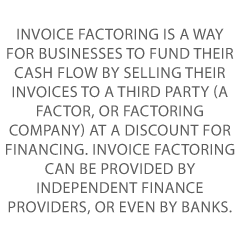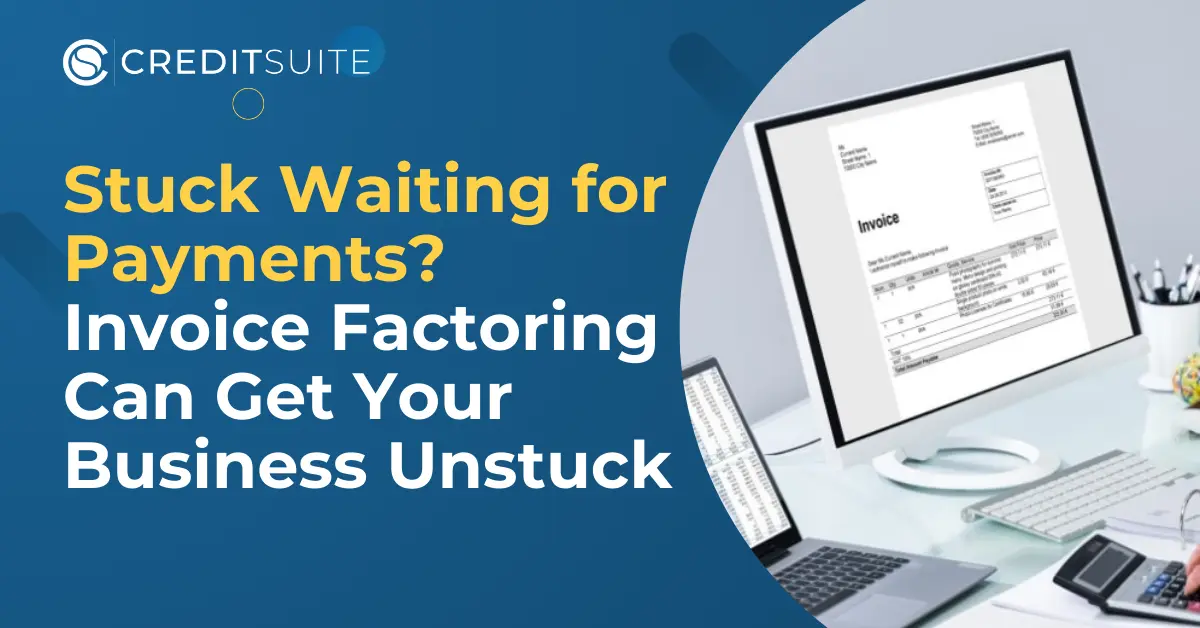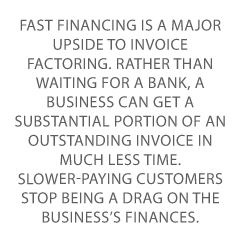If you are waiting for your clients to pay you, and you have proof of cash flow, invoice factoring might be a form of business financing that you have not tried yet.
With this form of revenue-based financing, you use unpaid invoices to get a percentage of a client’s outstanding invoice paid to you now.
What Is Invoice Factoring?

Invoice factoring is a way for businesses to fund their cash flow by selling their invoices to a third party (a factor, or factoring company) at a discount for financing. Invoice factoring can be provided by independent finance providers, or even by banks.
Since it is mainly based on invoice amount and the reliability of the account debtor to a business seeking invoice factoring, lenders generally will not have any burdensome document requests.
This also means that a business owner’s credit score does not have to be top-notch to get this form of company cash. It can also be more immediate cash, seeing as the lender only has to look at invoices and the companies in debt.
Contrast this with a merchant cash advance, which is based on past sales.
A business owner will not need to provide collateral, either. Invoice factoring hinges on the companies indebted to the borrower. If the lender is satisfied that they will honor their debt, then the lender will agree to provide cash.
Sellers who work with consumers and not businesses will not have this financing option.
How Does Invoice Factoring Work?
When a business offers payment terms to its customers—say, net 30—the business is stuck waiting for invoice payment. Offering payment terms (credit control) is a good business decision as it can be a deciding factor for customers.
But for the business, it means waiting around to be paid. The business, of course, has its own bills to pay. It’s a customer to a third party. In fact, it’s most likely a customer to several third parties. The business wants to maintain good relationships with its suppliers.
Also, business credit’s main factor is how well a business pays its bills. So, if the business is waiting to be paid, it could jeopardize its business credit-building efforts. Enter invoice factoring.
A business sells $1,000 in factoring invoices to a factoring company for, say, 5% ($50) of the invoice value. The factoring company quickly advances the business with, say, 85% of the total amount ($850). Then the factoring company goes after the debtor(s) to get the $1,000 in invoices paid.
Once the invoices are paid, the factoring company gives the remaining $100 to the business. That is, $1,000 – $50 = $950. And $850 + $100 = $950. The factoring company will then keep the $50 as its fee.
How Much Does it Cost to Factor Invoices?
Any fee will come down to the differences between recourse factoring and nonrecourse factoring. Recourse factoring is more common. It means that, if your clients do not pay back their debts, you are responsible for any unpaid balances.
In general, this means that recourse factoring will have a lower fee. It is also easier to get. For non-recourse, a business often must be a huge corporation. Non-recourse (invoice discounting) is an out-and-out sale of the debt to a factoring company. The factor assumes all collection responsibilities.
With modified non-recourse, a business may need to take out expensive credit insurance in order to be approved. If invoice factoring companies cannot collect, there may be a contractual clause allowing them to revert the debt back to you.
Then you’d be out the costs of:
- Credit insurance
- Any factoring fee and
- The outstanding, still-unpaid debt held by your customer
A factoring fee may be applied to an invoice amount or to the amount advanced. Hence a $1000 debt with a 5% factor rate applied to the invoice amount pays $50.
But that same company only pays $42.50 if the business gets a cash advance of 80% and the fee is applied to the advance.
Invoice Factoring Pros
Fast financing is a major upside to invoice factoring. Rather than waiting for a bank, a business can get a substantial portion of an outstanding invoice in much less time. Slower-paying customers stop being a drag on the business’s finances.
Easy approval is another positive factor with this financing. If your customers have a history of making good on their debts, then a factoring company will approve you. This is despite having poor personal credit or not a lot of time in business. All that matters is if your customers will pay,
You will not need to put up any collateral. This means your equipment or offices (if you own them) aren’t on the line if your customers default.
The invoice factoring company becomes the “bad guy” for collections, not you. Your business can maintain a good relationship with a customer, even if the customer, for some reason, is slow to pay. Invoice factoring companies take on the job of collections.
Your business will be able to offer favorable payment terms to your customers. Giving your customers an extra, say, 30 days to pay, could be a decisive factor for them remaining your customers. Your favorable payment terms could be the reason your business keeps a client.
Invoice Factoring Cons
Yes, invoice factoring companies take on the task of collecting. But are they fair, or ethical? Your clientele might not take too kindly to you selling their debts. They might make their displeasure known by ending their relationship with your business.
The debt factoring rate for an invoice factoring arrangement can be high, and there can be a hidden fee. The 5% sample figure, above, might not include an application fee or a fee for invoice processing. You may have to pay a credit check fee, too (for credit checks on your clients).
If your clients are late paying, that could trigger late fees and a higher annual percentage rate. You would, in effect, be paying twice for a late client. Once for the late fee, and a second time for a higher APR.
You are at the mercy of your customer’s business credit scores, really. If a customer doesn’t pass an invoice factoring company’s credit check, you may need to replace their invoice with one from a customer who does pass.
Since any company can fall on hard times, you could end up with a higher fee if a customer loses their biggest client, or their employee absconds with funds, or the supply chain breaks down.
How Can Businesses Qualify for Invoice Factoring?
Standard requirements for businesses wanting invoice factoring include:
- Your company must sell to businesses.
- The customers must be creditworthy.
- Your sales have to meet a certain figure, often $5,000 or more per month.
- There is limited or no access to a bank loan or other type of business loan.
- Your company is incorporated in the United States.
- You give customers 30 or more days to pay.
Companies that do not meet the cash flow per month factor may not qualify. But small business owners should always check.
In general, an invoice factoring company will want to see your outstanding accounts receivables. If it does not know your client’s creditworthiness, then it will perform business credit checks. Whether companies pass or not is out of your control.
If your clients do not pass their business credit checks, then your business will not qualify for an invoice factor. As a result, entrepreneurs should vet the companies they do business with.
This also means that invoice factoring is good for an unpaid invoice here or there. It’s probably not going to work when a business has habitually deadbeat clients. In that instance, the business will likely do best to either turn the debt over to a collection agency or write it off.
Invoice Factoring vs Invoice Financing
These are similar ways to get cash, although they are not identical.
With invoice factoring, you are selling your invoices to the invoice factoring service. But with invoice financing, your invoices become your collateral. But your business is still responsible for collections.
If your business was having trouble collecting from your clientele before working with a factoring company service, then it may be wishful thinking to assume they will be easier to collect from afterward.
And if you cannot pay your fees to the factoring company on time—or if a client’s default causes you to be late paying a different creditor—it will be a negative factor in your business credit report and score. But that’s also true of invoice factoring.
You can get money quickly with invoice finance. Another similarity is that you can get cash both ways even if your business credit is less than ideal.
Another similarity between invoice factoring and invoice financing is that they are both fast to fund. A business with an immediate, pressing need for cash should consider both.
Invoice finance can be like business loans or a line of credit, sometimes called an accounts receivable line of credit. Accounts receivable financing, AKA accounts receivable factoring, is only for B2B businesses.
How To Build Your Business Credit To Have More Financing Options
Businesses that do not have good corporate credit have limited options for cash. As a result, they tend to be offered a less favorable payment term. A business that is desperate for funding and has poor business credit is fairly well at the mercy of lenders.
But better business credit will open up more opportunities for funding. With more choices, a business will not have to settle for factoring, even if it needs money quickly. Since the business is less desperate for cash, it can afford to shop around for better rates.
The vast majority of vendors will not report positive payment history to the business credit reporting agencies. But they will report every unpaid invoice if it’s late. As a result, a business will need to strategically work with vendors that report positive payment histories.
At Credit Suite, we make it our business to know which vendors report, and which do not. When you apply only with vendors that report, it saves you time and money. And if your business has poor Fundability™, we will show you what you need to increase Fundability.
Your mission, once your business has open accounts with vendors which report, is to pay your bills with them on time. Also, some vendors may have minimum dollar amounts before they report, so be sure to pay attention to them as well.
Use business credit to finance your day-to-day business operations. Because the better your business credit is, the more choices you will have.


